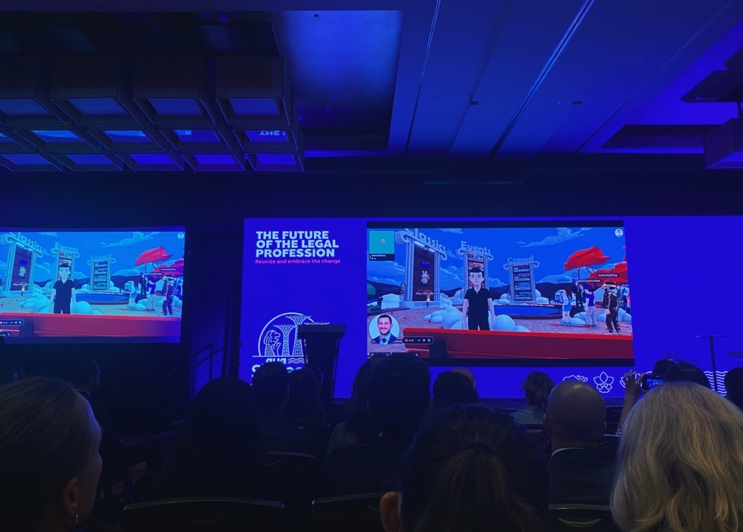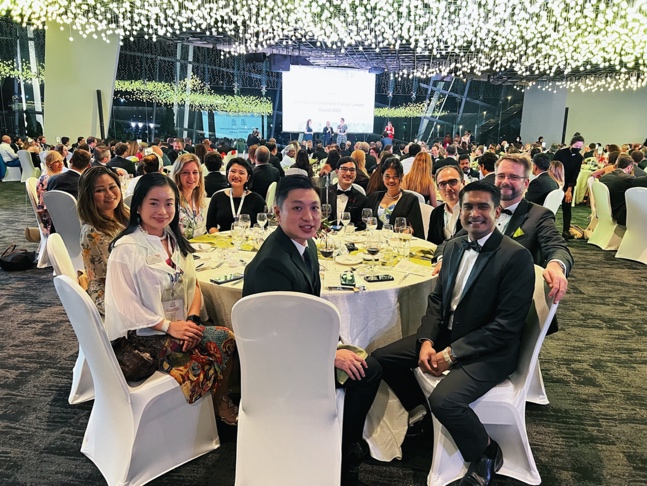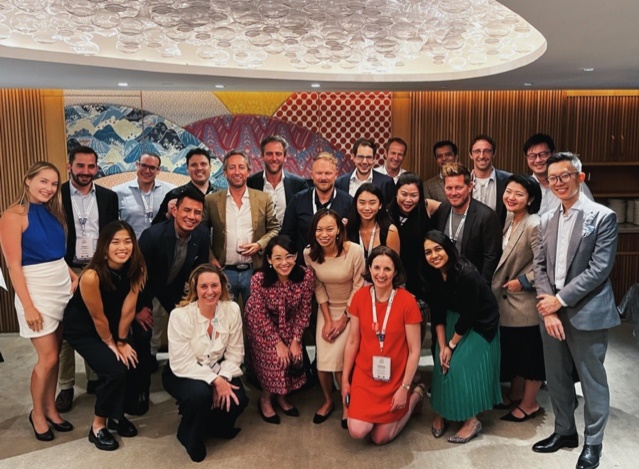
Reflections on the AIJA 60th Annual Congress

Second Minister for Law Mr. Edwin Tong SC delivering his Welcome Address at the 60th Annual Congress.

Keynote speaker for the Opening Ceremony, Professor Richard Susskind, joining the audience via Zoom.
Keynote speaker for the Opening Ceremony, Professor Richard Susskind, joining the audience via Zoom.
By way of background, AIJA (Association Internationale des Jeunes Avocats) – the International Association of Young Lawyers – is the only global association devoted to lawyers and in-house counsels under 45 years old.
AIJA currently boasts of around 4,000 members, including members from law firms of all sizes and cultures, as well as supporters, including Collective Members and Bar Associations from all over the world – a testament to the diversity of the AIJA community.
AIJA aims, amongst other things, to provide a platform for young lawyers to broaden their professional knowledge and develop their global network. Each year, there are more than 20 events (including webinars, seminars, conferences, and annual congress) with distinguished speakers sharing their insights on an array of practice areas, as well as social events for lawyers to expand their professional networks and build friendships.
The 60th AIJA Annual Congress was held from 22 to 27 August 2022 in Singapore, at Sands Expo and Convention Centre. This year’s theme was “The Future of the Legal Profession: Reunite and Embrace the Change”, which sparked lively discussions on what it means to practice law in this decade. This Annual Congress was attended by more than 400 delegates hailing from over 50 territories, some of whom had to endure over 20 hours of flight time to arrive in Singapore!

Anna Wyrzykowska (President of AIJA 2021/2022) delivering the Welcome Address at the Opening Plenary Session.
The Annual Congress comprised academic programmes, committee meetings, and social events, which took place over the course of the week. This year’s theme is especially befitting as we witnessed the profound repercussions of COVID-19 on a global scale. As we stride towards recovery post-COVID, the world around us has irrevocably changed, including the practice of law and the demands of our clients. Against this backdrop, this year’s Annual Congress focused on how young lawyers can ready themselves to emerge as tomorrow’s lawyers.
Due to space constraints, this article will focus on two broad areas of interest where law and technology intersect, not only in terms of the practice of law but also in relation to the management and operations of law firms.

One of the keynote speakers, Dan Jasnow from the United States, joined the Annual Congress virtually and took the audience on a quick tour in the metaverse.
The Future of Legal Practice
One academic session that stood out was the session organised by the Corporate and
M&A Commission. Entitled “The Future of the M&A Deal Process and Negotiations in 2050”, this session provided abundant insights on the potential future of mergers and acquisitions (M&A).
The panel consisted of distinguished legal professionals from Austria, Belgium, China, Singapore, and the United Kingdom, all of whom provided their opinions from their respective civil law / common law backgrounds. There were extensive discussions on how the deal process may transform in the future, the possible ubiquitous involvement of technology in M&A, as well as new-fangled issues that may arise as a result of the transformation of the deal process, all of which attracted dynamic exchange with the audience, who responded with their own insights and/or additional questions for the speakers.
From the discussions, it appears that the panel and audience are both confident that there are still areas of legal practice to which artificial intelligence cannot match up. A significant majority of the audience also remain open to further exploiting technology to support M&A deal process, as well as the wider, general practice of law.
The prevalence of technology is inexorable, with many experiencing digital transformation accelerated by COVID-19. In a pre-COVID setting, it would be challenging, or even wild, to imagine that transactions, such as mergers and acquisitions, can take place entirely online. Similar sentiments could be said for online dispute resolution, particularly, online hearings and court sessions. Along with recent approaches to doing business, it is almost certain that the boundaries between legal and business advice will blur – in this regard, it has been proffered that lawyers may eventually become holistic advisors to businesses, which is something we are already witnessing with the accounting firms’ acquisition of law firms to become a more comprehensive service provider.
As food for thought, the speakers highlighted that there could be potential unforeseen aspects of a transaction from totally new industries, which lawyers of the future should remain cognisant of.
While the above discussion centres on corporate practice, similar considerations apply to the area of dispute resolution as well as to the broader area of law firm management and operations.
In recent years, there has been increased use of technology in document-intensive work, such as discovery of documents. While the introduction of technology and tools aims to free up human resources for higher level work, it is crucial that there is adequate training provided to staff members in order to maximise uptake and usage. Potentially, after familiarising themselves with technology, law firms can move on from simply improving operational efficiency to contemplating systems which incorporate artificial intelligence and machine learning to help take on certain legal tasks.
Lawyers’ Value to Clients
In this day and age, it is salient to envisage the value that lawyers bring to clients, as there are numerous alternative service providers who are similarly able to provide legal related services, for instance, in the realm of intellectual property and company incorporation. This idea was further explored by the Guest of Honour, Minister Mr Edwin Tong SC, and renowned Professor Richard Susskind.
At the Opening Ceremony, Minister Tong noted that it is essential to keep up with technology to be better lawyers, as clients have become a lot more sophisticated and knowledgeable, and their demands a lot more complex. In this regard, keeping up with technology is key to better support lawyers’ own practices.
Propounding on this suggestion, lawyers may have to strategise how best to incorporate technology in the substantive areas of practice as well as in the management and operations of law firms. Legal practice management software, for instance, is an optimistic start.
Professor Susskind echoes this proposition and urges lawyers to reconsider the way legal services are delivered, as clients are progressively demanding more for less and alternative service providers are growing in the marketplace.
Further, as the world becomes increasingly borderless and technology-driven, Minister Tong highlighted that one important aspect of practice is for lawyers to build strong networks. These strong networks will allow lawyers to meet the demands of practice, as transactions and disputes now involve more parties across various jurisdictions.
In a similar vein, Professor Susskind suggests that lawyers are able to tackle the future demands of practice by involving professions from other areas and utilising technology to solve problems. As the boundaries between legal advice and business advice blur, lawyers will likely transform into business solutions advisors, where such practice becomes multi-disciplinary
and multi-faceted.
Minister Tong endorses this notion and similarly notes that business lines do not quite follow the way in which law firms are traditionally structured, as the legal industry can no longer exist in silos and should be looked at across a range of different expertise and disciplines. On this note, Minister Tong further observes that lawyers and law graduates today have much more options than before – one can apply to any firm (be it local or international), join legal tech players, go in-house or enter dispute resolution institutions, such as International Chamber of Commerce (ICC), INSOL, International Bar Association (IBA), and so on.
Accordingly, while the future may appear daunting due to a number of uncertainties, there are always opportunities present in these challenges. As long as lawyers do not confine themselves to conventional ways in the practice of law, they will be able to stay relevant in meeting the future demands of practice.
Conclusion
As technology burgeons at an exponential rate, no industry is spared from any potential disruption brought about by technology. Instead of perceiving technology as an adversary, it may be more appropriate to regard technology as a tool to complement the practice of law. This moment in time likewise presents a window of opportunity for us lawyers to rethink fundamental assumptions and mindsets, so that we can avoid obsolescence and are able to stay innovative and agile in order to better meet the ever-changing needs of today’s clients.

Gala Dinner at the Flower Dome, Gardens by the Bay.

Fellow delegates all dressed up for Gala Dinner!
While we are able to contemplate more creative offerings in response to client demands with the assistance of technology, nothing beats being back in person to physically attend meetings and conferences, greeting acquaintances in person and exchanging handshakes. There is no substitute for the human touch when it comes to providing legal services and establishing working relationships.
As the world becomes increasingly interconnected and businesses transform, it is inevitable that almost every aspect of practice will involve some semblance of cross-border element or multi-disciplinary component. In order for lawyers to stay ahead of the curve, the availability of strong networks to facilitate seamless dealings and meet client demands make a world of difference. This is all the more important for young lawyers who are finding their feet in today’s shifting climate.
The AIJA 60th Annual Congress presented abundant opportunities for networking with and learning from our foreign counterparts. It is never too early to start charting one’s professional trajectory and attending conferences of an international scale, such as the AIJA 60th Annual Congress, is strongly recommended to junior lawyers.

Home Hospitality Dinner hosted at Yàn, National Gallery.

Catching up over drinks at Welcome Reception at Lantern, Fullerton Bay Hotel.





